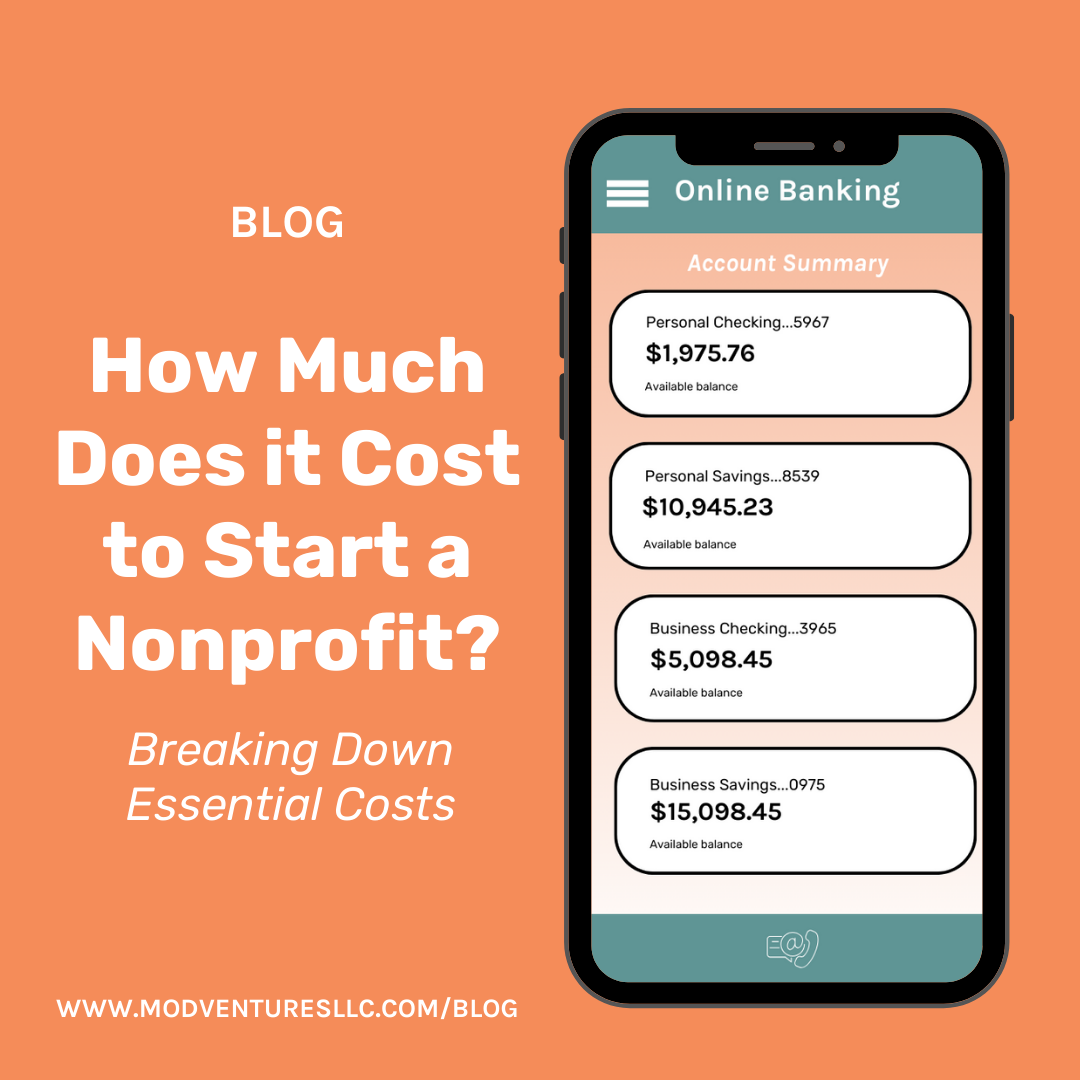By: Gabrielle Luoma CPA, CGMA
By: Gabrielle Luoma CPA, CGMA
Starting a nonprofit is a meaningful and rewarding endeavor, but it’s essential to understand the costs involved. Many new founders underestimate the financial requirements, which can lead to stress and unexpected challenges down the road.
By knowing the essential costs upfront, you can better plan, budget, and focus on your mission. Here’s a breakdown of the primary expenses associated with starting a nonprofit organization.
#1. Incorporation Fees
To form a nonprofit, you must first register as a corporation in your state, and this process typically involves filing Articles of Incorporation with the appropriate state agency. State filing fees vary, usually from $50 to $400, depending on your location.
Some states also have expedited processing options for an additional fee if you’re looking to speed up the approval process.
Estimated Cost: $50 – $400
#2. Federal Tax-Exempt Status (IRS Form 1023)
Once incorporated, your nonprofit will likely want to apply for 501(c)(3) tax-exempt status with the IRS, which is necessary for most nonprofits to receive tax-deductible donations.
The IRS offers two application forms: Form 1023-EZ and Form 1023. Form 1023-EZ, a shorter, streamlined version, is available to smaller organizations with anticipated gross receipts of $50,000 or less. The filing fee for Form 1023-EZ is $275, while the full Form 1023 costs $600.
Estimated Cost: $275 – $600
#3. State Tax Exemption
In addition to federal tax-exempt status, many states require nonprofits to apply for state-level tax exemptions. This process varies from state to state, and some charge a filing fee. While this cost may be lower than federal fees, it’s an essential part of operating a nonprofit legally and keeping costs low in the long term.
Estimated Cost: $0 – $100 (varies by state)
#4. Legal and Accounting Fees
Navigating the legal and financial requirements for starting a nonprofit can be complex, and many founders choose to work with professionals. Legal assistance may be needed to draft bylaws, navigate tax-exemption paperwork, and establish governance policies. Additionally, hiring an accountant ensures that financial statements are set up correctly from the start, which is crucial for compliance.
Working with professionals can streamline the process, reduce the risk of errors, and ensure that your nonprofit is compliant with federal and state regulations. Legal and accounting fees can range widely based on your organization’s complexity and location.
Estimated Cost: $500 – $5,000 (varies based on services and location)
#5. Office Space and Equipment
If your nonprofit requires physical office space, consider the costs for rent, utilities, and office supplies. Many new nonprofits start by working out of a home office or using shared co-working spaces to keep costs low. However, if you do plan to rent, make sure to budget for initial security deposits and furnishing costs.
Office equipment like computers, printers, phones, and software are also essential expenses. Fortunately, many companies offer discounted or donated office supplies and software to nonprofits.
Estimated Cost: $0 – $5,000 (depending on office needs)
#6. Insurance
Nonprofits should consider general liability insurance to protect against potential risks, especially if your organization plans to hold events, interact with the public, or employ staff.
Additionally, directors and officers (D&O) insurance is recommended to protect board members from legal liability. Insurance premiums vary widely, but it’s essential to include this in your initial budget to safeguard your organization.
Estimated Cost: $500 – $2,000 annually
#7. Marketing and Branding
To attract supporters and spread awareness of your mission, you’ll need a basic marketing strategy. This might include branding costs, such as logo design, website development, and social media setup. While some of these tasks can be done on a low budget, a professional website and branding materials can add credibility and attract potential donors or partners.
Many nonprofits opt to start small and grow their marketing efforts over time. Using low-cost tools, like social media and email newsletters, can be an effective way to build awareness initially.
Estimated Cost: $500 – $3,000
#8. Initial Fundraising Costs
Fundraising is a vital part of any nonprofit’s operations, and there are costs associated with setting up your first campaigns. These might include purchasing fundraising software, planning initial events, or paying fees for online donation platforms. Platforms like PayPal or GoFundMe often charge a small fee per transaction, so be sure to account for these costs as part of your fundraising budget.
If you plan to hold events, budget for potential venue rentals, promotional materials, and any additional costs related to food, decorations, or supplies.
Estimated Cost: $200 – $2,000
#9. Staff and Volunteer Management
If your nonprofit plans to hire employees, you’ll need to budget for salaries, payroll taxes, and benefits. For smaller nonprofits, hiring staff may not be an immediate need, but it’s wise to budget for volunteer management tools or stipends if volunteers will be helpful to your operations. Some nonprofits also invest in volunteer management software to streamline scheduling, training, and communication.
Estimated Cost: Varies widely based on staff and volunteer needs
Total Estimated Cost
Starting a nonprofit can vary significantly based on location, size, and the scope of your mission. Here’s a general estimate:
- Small, Simple Setup: $1,500 – $3,000
- Medium Setup with Professional Help and Marketing: $5,000 – $10,000
- Larger Setup with Office Space, Full Branding, and Initial Fundraising Events: $10,000+
How Much Does it Cost to Set Up a Nonprofit?
While there’s no one-size-fits-all answer to the question of how much it costs to start a nonprofit, understanding the core expenses can help you create a realistic budget. From initial filing fees to marketing and fundraising costs, these essential expenses are key to launching a nonprofit that can effectively pursue its mission.
Planning for these costs upfront will help your organization build a strong foundation and ensure compliance. If you’re ready to start a nonprofit or need guidance with your existing organization’s financial setup, consider consulting with a financial expert who specializes in nonprofit management.
With the right support, your nonprofit can start strong and make a lasting impact — get in touch with the MOD VENTURES LLC team when you’re ready to get started!
You May Also Love
CLOSE






